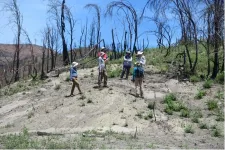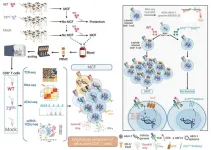(Press-News.org) The National Science Foundation will provide funding to the University of Virginia’s Data Justice Academy, the agency recently announced, support that will help the summer program continue to serve undergraduate students from groups that are historically underrepresented in data science.
Established in 2021, the Data Justice Academy provides a 10-week residential experience to participants in which they perform mentored research while learning technical skills.
The overriding goal of the Data Justice Academy, which is jointly managed by UVA’s School of Data Science and Equity Center, is to highlight for participating students how data science and computational social science can be used to help communities and promote a more just world.
Thus far, the academy has provided such opportunities to more than 30 undergraduate students to work on projects focused on issues like health disparities, privacy concerns with large language models, the labelling of transgender individuals in census and public health data collection, and many more — all centered around the three research pillars of the Data Justice Academy: social inequality, ethical data science, and critical data studies.
Demonstrating the positive impact data projects can have on communities is vital to recruiting students from minority groups and other backgrounds to STEM-related fields, the academy’s organizers say.
“Research experiences at the undergraduate level have been classified as a high-impact practice — that is, they transform student engagement, performance, retention, and well-being,” said Claudia Scholz, founding director of the Data Justice Academy and director for research development at the School of Data Science. “We are grateful for NSF’s support to allow us to continue to provide these experiences to students from underrepresented groups."
Throughout the 10-week program, students work with School of Data Science faculty and graduate students, providing participants invaluable professional development as they look ahead toward potential graduate school opportunities and their career paths.
In the funding proposal to the NSF, academy organizers laid out planned research efforts for upcoming cohorts of students.
They include the Climate Justice Mapping project, aimed at identifying opportunities for equitable climate planning; the Housing Justice Atlas project, which will develop a predictive model to analyze various eviction challenges given different policy scenarios; an initiative to mitigate demographic bias in facial recognition; and an examination of the political economies of digital identity and biometric systems in the humanitarian sector.
The NSF award is expected to fund the Data Justice Academy through summer 2027. The directors of the grant are Scholz and Yue Cheng, an associate professor at the School of Data Science.
Since its inception, the program has received support from Capital One, Deloitte, Oracle, and a private gift.
Past participants in the Data Justice Academy will gather in Charlottesville, Virginia, Aug. 1-2 for a reunion and symposium.
END
UVA's Data Justice Academy receives new funding from NSF
2024-07-29
ELSE PRESS RELEASES FROM THIS DATE:
Orthopedic surgeon-scientist Dr. Frank Henn named Chair of the Department of Orthopaedics
2024-07-29
University of Maryland School of Medicine (UMSOM) Dean Mark T. Gladwin, MD, announced today that R. Frank Henn, III, MD, Professor of Orthopaedics, who has served as Interim Chair of the Department since 2022, has been appointed to serve as the new Chair of UMSOM’s Department of Orthopaedics, effective immediately.
Dr. Henn, who joined the Department in 2010, is an academic leader and highly regarded, board-certified orthopaedic surgeon; he has published significant scientific research, and is a leading clinician focusing on the care of the shoulder and knee, with an emphasis in cartilage ...
Nature inspires a breakthrough: scientists develop revolutionary egg white-based bioink for advanced tissue engineering
2024-07-29
Los Angeles, California – July 29, 2024 - Terasaki Institute scientists have created a cutting-edge technology inspired by nature by developing a novel bioink derived from egg whites or Egg White methacryloyl (EWMA). Bioinks are mainly used in 3D bioprinting to create artificial tissues. These natural or synthetic materials support living cells, aiding their adhesion, growth, and differentiation. They are essential for developing complex tissue structures for medical research, drug testing, and organ transplantation. This novel EWMA bioink represents a promising addition to this field, offering a unique combination of properties that address many challenges faced in tissue engineering.
The ...
California a botanical and climate change hot spot
2024-07-29
From coastal redwoods and Joshua trees to golden poppies and sagebrush, California is a global botanical hotspot. It’s also a place confronted with extreme heat, wildfires and crumbling coastlines. The state’s natural beauty and history of pioneering conservation efforts make it a test bed for protecting biodiversity in the face of current and future climate change, argues a study led by the University of California, Davis.
Published July 29 in Proceedings of the National Academy of Sciences, the study, “Climate Change and California’s Terrestrial Biodiversity,” is part of a special ...
Young scientists face career hurdles in interdisciplinary research
2024-07-29
COLUMBUS, Ohio – Scientists agree that solving some of society’s greatest challenges in biomedicine such as food sustainability, aging and disease treatment will need researchers from a variety of scientific fields working together.
But a new study finds that the young scientists who most embrace interdisciplinary research face “career impediments” not seen in their peers who focus their work only within their own disciplines.
The results are troublesome and pose a “grave challenge” to efforts to increase interdisciplinary ...
New progress in research into malignant catarrhal fever in cattle
2024-07-29
A research team led by University of Liège scientists has published a groundbreaking study on malignant catarrhal fever (MCF). This disease is caused by the alcelaphine gammaherpesvirus 1 (AlHV-1), which infects its natural host, the wildebeest. This study sheds light on the mechanisms by which this virus, which is asymptomatic and latent in the wildebeest, causes an oligoclonal expansion of CD8+ T lymphocytes in cattle, leading to the development of MCF.
In 2013, the research team had already demonstrated (1) that malignant catarrhal fever (MCF), which is fatal in cattle, only develops if the AlHV-1 virus can maintain a ...
Words like ‘this’ and ‘that’ act as attention tools across languages
2024-07-29
All languages have words like ‘this’ and ‘that’ to distinguish between referents that are ‘near’ and ‘far’. Languages like English or Hebrew have two of these ‘demonstratives’. Languages like Spanish or Japanese use a three-word system. For instance, in Spanish, ‘este’ signals something close to the speaker, ‘ese’ signals something far from the speaker but close to the listener, and ‘aquel’ signals something far from both.
“The reason why we were interested in demonstratives is because of their ...
Local food production saves costs and carbon
2024-07-29
Local foods are critical to the food security and health of Indigenous peoples around the world, but local "informal" economies are often invisible in official economic statistics. Consequently, these economies may be overlooked in the policies designed to combat climate change. For instance, Indigenous communities in the North American Arctic are characterized by mixed economies featuring hunting, fishing, gathering and trapping activities, alongside the formal wage economy. The region is also undergoing a rapid transformation due to social, economic and climatic changes. In Canada, the introduction ...
Bold moves needed for California agriculture to adapt to climate change
2024-07-29
California should take urgent and bold measures to adapt its $59 billion agriculture sector to climate change as the amount of water available for crops declines, according to a collaborative report by University of California faculty from four campuses.
Published in the Proceedings of the National Academy of Sciences, the report provides a roadmap for more water capture, storage, and distribution systems that are in harmony with climate projections and ecosystems. It further considers how runoff and groundwater can be used repeatedly ...
To get drivers to put down their phones, make it a game
2024-07-29
If you’re trying to keep drivers from picking up their phones, make it a game, according to a new Proceedings of the National Academy of Sciences (PNAS) study led by researchers from the Perelman School of Medicine at the University of Pennsylvania. When drivers could earn points for making reductions in handheld phone use and had the chance to compete in a weekly leaderboard of others like them, researchers saw as much as a 28 percent reduction in handheld phone use while driving, a habit that stuck once the intervention—and the games—ended.
“Distracted driving ...
Study identifies protein that affects health of gut microbiota and response to bacterial infection
2024-07-29
A study reported in Proceedings of the National Academy of Sciences (PNAS) shows how the presence of a specific protein called IL-22BP affects the composition of the gut microbiota and the body’s response to bacterial infection.
“We discovered that mice that don’t produce this protein are more protected against intestinal infections by bacteria like Clostridioides difficile and Citrobacter rodentium,” Marco Aurélio Ramirez Vinolo, a co-author of the article, told. He is a professor at the State University of Campinas’s Institute of Biology (IB-UNICAMP) in Brazil and head of its Immunoinflammation Laboratory.
IL-22BP ...






